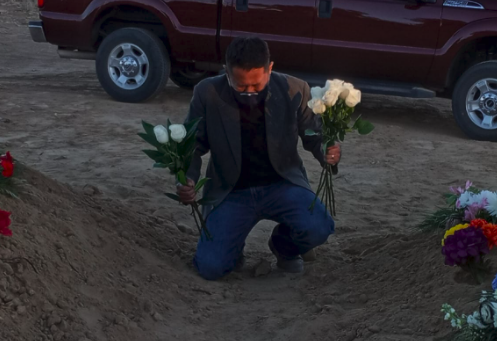
- Details
- By Native News Online Staff
ATLANTA — A study by the Centers for Disease Control and Prevention (CDC) released on Thursday reveals American Indians and Alaska Natives (AI/NA) have died from Covid-19 at a rate almost double of their white counterparts. The study was conducted in 14 states that have approximately one-half of the Native population in the United States.
Researchers discovered the Covid-19 related mortality rate among the AI/AN people from Jan. 1 to June 30 was 55.8 deaths per 100,000, or 1.8 times higher than the rate of 30.3 deaths per 100,000 among whites.
As of Dec. 2, the CDC says nearly 2,700 Covid-19-related deaths have occurred among the AI/NA population. A recent analysis found that the cumulative incidence of laboratory-confirmed COVID-19 cases among AI/AN persons was 3.5 times that among White persons.
“Although COVID-19 mortality rates increased with age among both AI/AN and White persons, the disparity was largest among those aged 20–49 years. Among persons aged 20–29 years, 30–39 years, and 40–49 years, the COVID-19 mortality rates among AI/AN were 10.5, 11.6, and 8.2 times, respectively, those among White persons. Evidence that AI/AN communities might be at increased risk for COVID-19 illness and death demonstrates the importance of documenting and understanding the reasons for these disparities while developing collaborative approaches with federal, state, municipal, and tribal agencies to minimize the impact of COVID-19 on AI/AN communities,” the study said.
The study cited financial and transportation barriers may have prevented the Native population from timely care, which resulted in illness resulting in the higher mortality rate.
The high mortality rates among the AI/AN population may be worse because the researchers noted data may not have accounted for misclassification in vital record systems. For instance, an intake health worker may record a race category based on visual observation, without ever asking the patient about being an American Indian or Alaska Native.
"Strategies can draw on cultural factors that include protecting elders and ensuring a healthy future for younger generations. Improving the quality of COVID-19 data will be important for AI/AN communities and their partners to identify populations experiencing excess risk and plan and implement prevention activities and medical countermeasures," the study says.
More Stories Like This
National Indian Health Board's Strategic Plan Listening Tour Underway‘You Are Never Alone’ | How One Tribe Is Fighting Youth Suicide With Culture and Crisis Response
‘Our Culture is Prevention’
This National Cancer Prevention Month, Reduce Your Risk
New Mexico Will Investigate Forced Sterilization of Native American Women

